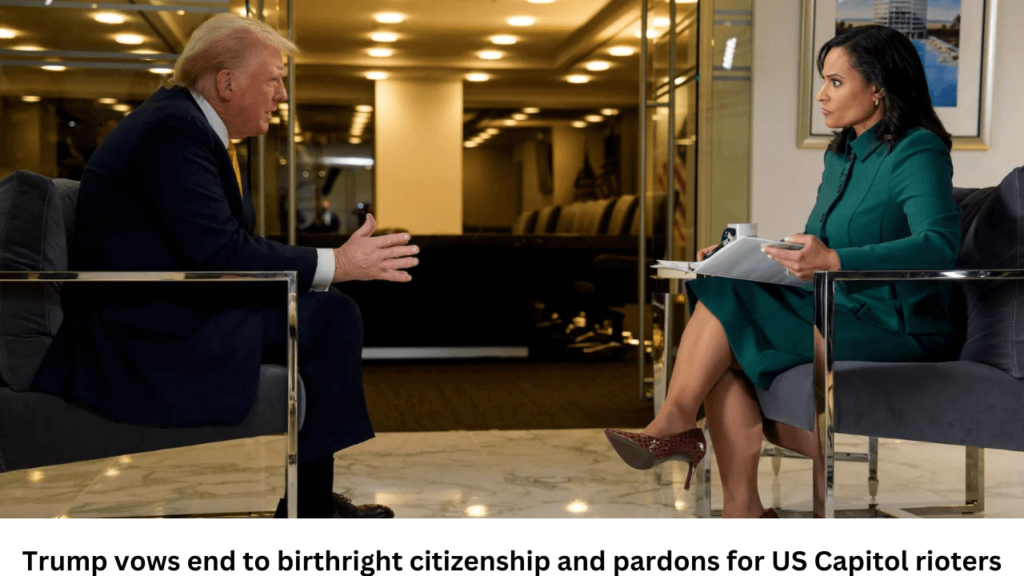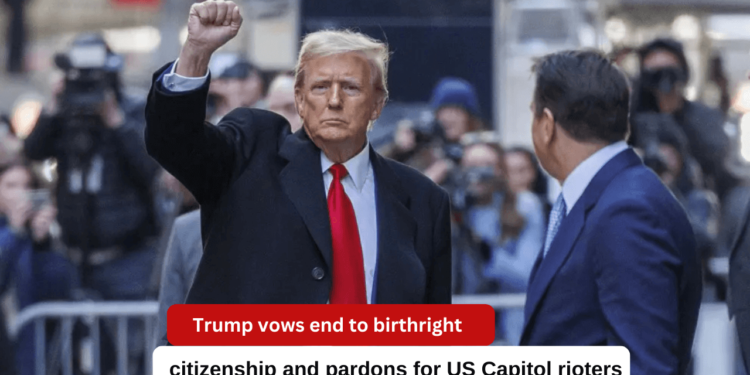President-elect Donald Trump has unveiled a series of bold and polarizing initiatives ahead of his return to the White House. In a headline-making interview with NBC, Trump vowed to revoke birthright citizenship, pardon individuals involved in the 2021 US Capitol riots, and implement sweeping executive orders targeting immigration, energy, and the economy. The announcement has ignited intense debate across political and legal circles. Here’s a closer look at what “Trump Ends Birthright, Pardons Rioters” could mean for the United States.
Trump Ends Birthright, Pardons Rioters: Key Announcements
Revoking Birthright Citizenship
One of the most contentious promises in Trump’s NBC interview was his pledge to end birthright citizenship. This policy, rooted in the 14th Amendment of the US Constitution, guarantees citizenship to anyone born on American soil, regardless of their parents’ nationality.
Trump emphasized his determination to change this longstanding principle, stating, “We’re going to have to get it changed.” He acknowledged the potential constitutional hurdles but remained firm that executive action could set the stage for reform. This move, if executed, would redefine what it means to be an American citizen and profoundly impact immigration policy.
Pardons for Capitol Rioters
Trump also declared his intention to “act very quickly” to review and potentially pardon those convicted in connection with the 2021 Capitol riot. Labeling their imprisonment as unjust, he stated, “These people are living in hell.” He promised to prioritize these cases on his first day back in office, signaling his unwavering loyalty to his supporters involved in the incident.
The move has sparked criticism from political opponents who view it as an attempt to rewrite the narrative surrounding the riot, which was widely condemned as an attack on democracy.
Trump Ends Birthright, Pardons Rioters: Broader Policy Plans
Immigration Overhaul
In addition to ending birthright citizenship, Trump reaffirmed his commitment to stricter immigration policies. He expressed a desire to deport undocumented immigrants, including those with American-born family members, while promising to work with Congress on a pathway for Dreamers—individuals brought to the U.S. as children under the Deferred Action for Childhood Arrivals (DACA) program.
While some of his rhetoric suggested a willingness to collaborate with Democrats on immigration reform, his firm stance on deportation and birthright citizenship indicates a hardline approach that could reshape the nation’s immigration landscape.
Executive Orders on Energy and Economy
Trump promised a flurry of executive actions targeting energy independence and economic growth. While specifics were sparse, he hinted at revisiting tariffs, reshaping trade policies, and rolling back regulations he believes stifle American industry.
These measures reflect Trump’s broader strategy of leveraging executive authority to bypass congressional gridlock, a tactic he has employed effectively in the past.

Trump Ends Birthright, Pardons Rioters: Foreign and Domestic Implications
NATO and Foreign Aid
Trump reiterated his conditional support for NATO, emphasizing that member nations must “pay their bills” for the U.S. to remain engaged. He also signaled a potential reduction in aid to Ukraine, a move that could shift the dynamics of U.S. foreign policy under his leadership.
Political Retribution and Accountability
Despite earlier vows to pursue investigations against political adversaries, Trump appeared to walk back his position on probing President Joe Biden. However, he criticized lawmakers who investigated his role in the Capitol riot, stating they “should go to jail.”
This apparent contradiction underscores the complexity of Trump’s approach to accountability and retribution as he seeks to balance political strategy with public perception.
Trump Ends Birthright, Pardons Rioters: The Debate Ahead
Trump’s bold promises have reignited debates about the scope of presidential power and the future of key policies like immigration and justice reform. While his supporters applaud his decisive stance, critics warn of the legal and ethical challenges his proposals could face.
As Trump prepares to take office, the nation waits to see how his pledges, including the controversial “Trump Ends Birthright, Pardons Rioters” agenda, will unfold. Whether his actions will solidify his legacy or deepen divisions remains a question only time can answer.
Conclusion
Trump’s return to the White House is shaping up to be as transformative and controversial as his first tenure. With promises to end birthright citizenship and pardon Capitol rioters, his policy agenda is poised to redefine the political landscape. The implications of his plans will reverberate across America, shaping the nation’s future for years to come.














































